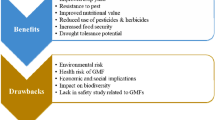Abstract
This article argues that three sorts of ethical considerations converge to yield a common positive answer to the question of the ethical acceptability of GM crops: (1) the rights of people in various countries to choose to adopt GM technology; (2) the balance of likely benefits over harms to consumers and the environment from GM technology; and (3) the wisdom of encouraging discovery, innovation, and careful regulation of GM technology.
Access this chapter
Tax calculation will be finalised at checkout
Purchases are for personal use only
Similar content being viewed by others
References
Comstock G (1988) The case against bGH. Agric Hum Values 5:36–52. The other essays are reprinted in (2) chapt. 1–4
Comstock G (2000) Vexing nature? On the ethical case against agricultural biotechnology. Kluwer Academic Publishers, Boston
Gressel J (1999) Observation at the Annual Meeting of the Weed Science Society of America, Chicago, 10 Feb 1998; Ryan A, et al. Genetically modified crops: The ethical and social issues. The Royal Society, London, section 1.38
Fox J, Hayes D, Shogren J (2002 Jan) Consumer preferences for food irradiation: How favorable and unfavorable descriptions affect preferences for irradiated pork in experimental auctions. J Risk Uncertain 24(1):75–95
Kass L (1988) Toward a more natural science: Biology and human affairs. Free Press, New York; Kass L (1998) Beyond biology: Will advances in genetic technology threaten to dehumanize us all? The New York Times on the Web, 23 August 1998, online at http://www.nytimes.com/books/98/08/23/reviews/980823.23kassct.html
McNeill W (1989) Gains and losses: An historical perspective on farming. The 1989 Iowa Humanities Lecture. National Endowment for the Humanities and Iowa Humanities Board, Iowa City, IA, p. 5
Midgley M (2000) Biotechnology and monstrosity: Why we should pay attention to the ‘yuk factor’. Hastings Center Rep 30(5):7–15
Nelkin D, Lindee MS (1995) The DNA mystique: The gene as cultural icon. Freeman, New York
Acknowledgment
Parts of this chapter were previously published:
Comstock G (2000) Vexing nature? On the ethical case against agricultural biotechnology. Kluwer Academic Publishers, Boston/Dordrecht, pp. 182–195, reprinted with permission of the publisher.
Comstock G (2001) Ethics and genetically modified foods, reprinted with permission of SCOPE GM Food Controversy Forum (1 July 2001). Copyright ©2001 American Association for the Advancement of Science.
Comstock G (2000) Make plans on the hoof. In: Times Higher Education Supplement (London) 22–29 Dec 2000, p. 19.
I learned much from discussing these ideas with colleagues, especially G. Varner, T. Smith, N. Hettinger, M. Saner, R. Streiffer, D. Hayes, K. Hessler, F. Kirschenmann, and C.S. Prakash. I was also fortunate to participate in several conversations on the topic during the past few months, and would like to express gratitude to my hosts, including the following:
Three local chapters of the American Chemical Society at Eastern Oregon University (R. Hermens), Washington State University (R. Willett), and Seattle University (S. Jackels) in Oct 2000.
The “New Zealand Royal Commission on Genetic Modification”; a public audience in Wellington, New Zealand (sponsored by the New Zealand Life Sciences Network, and F Wevers); and St. John’s College, Auckland, New Zealand (G. Redding), Nov 2000.
The “Plant Sciences Institute Colloquium”, Iowa State University, Feb 2001 (S. Howell).
“Biotech Issues 2001”, an Extension In-Service conference at Colorado State University (B. Zimdahl and P. Kendall); and a seminar in the CSU Philosophy Department (P. Cafaro and H. Rolston); both in Feb 2001.
The 2001 Annual Meeting of the American Association for the Advancement of Science, San Francisco, in February (K.R. Smith and N. Ballenger).
A seminar at the University del Pais Vasco/Euskal Herriko Unib., Vitoria, Spain, in March (M. Salona, M. de Renobales).
A seminar in the Departamento de Microbiologia e Instituto de Biotecnología, Universidad de Granada, Spain, in March (E. Ianez).
A colloquium on environmental ethics, “Colóquio Ética Ambiental: uma ética para o futuro” at Faculdade de Letras da Universidade de Lisboa, Mar 2000 (C. Beckert).
A seminar at the Center for International Development and Science, the Technology and Public Policy Program, and the Belfer Center for Science and International Affairs, Harvard University, Mar 2001 (C. Juma and D. Honca).
The National Agricultural Biotechnology Council, annual meeting, May 2001 (D. Birt, C. Scanes, and L. Westgren).
The Center for Judaism and the Environment, and Center for Business Ethics, Jerusalem College for Technology, Israel (A. Wolff, P. Rosenstein, and J. Rose); and “Symposium 2001: Plant Biotechnology, Its Benefits Versus Its Risks”, Tel Aviv University, Israel, May 2001 (B. Epel and R. Beachy).
This essay originally appeared as “Ethics and Genetically Modified Foods,” SCOPE Research Group (U. California-Berkeley, U. Washington, and American Association for Advancement of Science, July 2001)
In describing this method, I have drawn on an ethics assessment tool devised by Courtney Campbell, Philosophy Department, Oregon State University, and presented at the Oregon State University Bioethics Institute in Corvallis, OR, Summer 1998
Author information
Authors and Affiliations
Corresponding author
Editor information
Editors and Affiliations
Rights and permissions
Copyright information
© 2010 Springer Science+Business Media, LLC
About this chapter
Cite this chapter
Comstock, G. (2010). Ethics and Genetically Modified Foods. In: Gottwald, FT., Ingensiep, H., Meinhardt, M. (eds) Food Ethics. Springer, New York, NY. https://doi.org/10.1007/978-1-4419-5765-8_4
Download citation
DOI: https://doi.org/10.1007/978-1-4419-5765-8_4
Published:
Publisher Name: Springer, New York, NY
Print ISBN: 978-1-4419-5764-1
Online ISBN: 978-1-4419-5765-8
eBook Packages: Humanities, Social Sciences and LawPhilosophy and Religion (R0)




